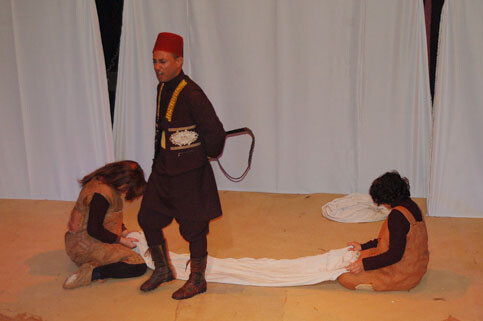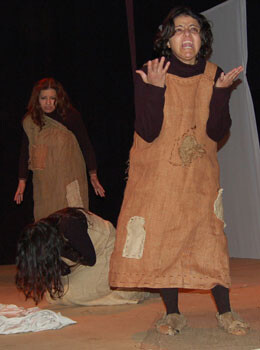The Electronic Intifada 9 April 2010

A scene from Kull Shi Tamaam.
It takes an Arab to live in the midst of political divisions, years of siege and occupation, and still say, “everything is fine.” Specifically, it must be an Arab man. Ask any woman in Gaza and she will tell you the opposite.
That is, at least, the main message that comes across so clearly in the latest play staged in the Gaza Strip bearing the name “Kull Shi Tamaam” (Everything is Fine), written by local playwright Atef Abu Seif — a prolific author from Jabalia refugee camp.
It is not commonplace for women to take center stage in Gaza, but 36-year-old Abu Seif tackles head on the thorny issue of their discrimination in the well-received play staged in Gaza City.
On stage, three women play the roles of the diverse situations of Palestinian women in a an overwhelmingly conservative and male-dominated society, on top of a crippling occupation and blockade that also tends to shape the dynamics between women and men.
Directed by Hussein al-Asmar and supported by the European Union, the play starts with the three women rolled in tight white burial shrouds as they try to break out, while an invisible force represented by male actor Nidal Damu works against them to keep them in their place.
One of the women, called Huda and played by Enas al-Saqqa, turns out to be a victim of the raging internal Palestinian political divisions. Her husband and brother, she says, killed each other during the bloody June 2007 clashes that erupted in Gaza between forces controlled by the Palestinian Authority leadership in Ramallah, and those controlled by the Hamas government, even though they were close friends. The violence, which has left a mark to this day, saw family members, friends, relatives and neighbors fighting each other in the streets.
Nagham, another woman, played by Samah al-Sheikh, is a 30-year-old whose father would not allow to enter university until her future husband — who is her cousin — will decide whether she should study or not.
The problem is that her cousin is living in Syria, and has — just like thousands of other Palestinians living outside the West Bank and Gaza Strip — been unable to return to his occupied homeland, leaving Nagham in limbo. She is, in other words, a victim of Israel’s procrastination in implementing the Oslo Accords that it reached with the Palestine Liberation Organization in 1993.
This means that to this day, Palestinian families remain divided, with few living within the occupied territories and many more abroad, and an almost total freeze on movement between the West Bank and Gaza Strip.
A third woman called Suha — played by Mai Zaidan — seems much more assertive in comparison with the other two as she tries to claim her power as a woman. She blames Huda and Nagham for their weaknesses and appeals to them not to surrender to society’s pressures. But after a heated argument, she also realizes that she suffers from their same fate in this male-dominated society.
Actor Nidal Damu plays the role of the “invisible power.” Despite the various guises of this power it always appears as a man, which reflects the male-controlled society. In one instance he appears as a modern man, wearing a fashionable suit and tie while smoking a pipe.
Despite his semblance of modernity, his attitude betrays a primitive and arrogant vision when he says: “Everything belongs to me … I own you and every one of the coming generations.”
The second character appears wearing a turban and a cloak, recalling Salah al-Din and the scientific renaissance of the Arab world in the Middle Ages.
“I am undisputed master … I am the master of every thing, I am the history, … I am the glory … you have neither life nor future without me,” this time betraying he is stuck in the past, praising a glorious past but no present.
In this, Abu Seif is joining several critical Arab authors who bemoan the Arab world’s glorification of the past and in the process remain romantically stuck in a bygone era.
Palestinian researcher and human rights activist Salah Abdulati says, in his study “The Palestinian Women between Reality and Ambition,” that the superiority of males in Palestinian society does not leave room for women’s freedom of expression and plurality of opinions.
He says that the social, civil, economic and political crisis the Palestinian society is going through is a result of itself being tied to old and recycled ideas and beliefs that are ultimately fruitless and lead to further subjugation and humiliation of women under the pretext of tradition and religion.
The man appears later as a feudal estate owner, armed with whip, red tarbush or fez and boots, while he praises himself for his generosity towards his slaves.
“I am, the source of their food, they are my slaves, they will be happy only when I am happy,” he says. “I decide what is wrong or right … they are not allowed to think … they are unable to think.”

A scene from Kull Shi Tamaam.
“Nobody complains,” he adds. “I decide the rights of women, they cannot decide … I will crush any opposite expression, those who speak about rights are liars.”
Palestinian society is experiencing a “police system” in both the Gaza Strip ruled by Hamas and the West Bank controlled by Fatah.
Palestinian human rights organizations in the occupied Palestinian territories have repeatedly accused both Hamas and Fatah of violating human rights as the respective security establishments overrule the judicial system and the rule of law.
On International Women’s Day, Al-Mezan Center for Human Rights in Gaza called on the West Bank Palestinian Authority and Hamas and all Palestinian factions to respect women and to empower them through political participation and by giving them more opportunity to participate in the labor force.
The play reaches its climax when the women decide to challenge the “man,” who appears as a goblin, surprising the audience by entering from its midst carrying a torch.
The goblin jumps on the stage pointing the light at the faces of the three women while they scream and ask, “who are you?”
To Huda, he replies: “I am your husband who killed your brother, and your brother who killed your husband.” To Nagham, he says: “I am your cousin who will never arrive,” and to Suha he says he is her cousin’s whip.
The three women unite and rebel against the goblin until they force him to give up and physically collapse on the stage.
In a brief argument, they tell him they have decided to “practice their right to live as human beings” like the rest of the women around the world. “We have realized you are a lie, an illusion, a myth … you are nothing,” they tell him. “We have to rip you apart.”
Nagham decides to join the university to become a well-known engineer. Suha decides not to pay any attention to her annoyed cousins, while Huda decides to hug her children and compensate them for the grief and pain.
The playwright Atef Abu Seif says that he tried to depict three stories and mix them together as examples of pressures facing Palestinian women.
“The tragedy of the current Palestinian situation is presented through the soft and deep dialogue between the three women,” he said in an interview. “Alongside this there is the invisible power presented by a male who appears in each act in different forms and uses a different tone.”
Actress Enas al-Saqqa revealed that she felt a “special emotion” when she was on the stage playing a role of a real story in which a woman lost her brother and her husband.
“The story is not just imagination, it has really happened,” she said. “Palestinian women lost their loved ones during internal clashes.”
Many of the women in the audience were visibly moved by the play, some with tears in their eyes and others interacting directly with the actors as the events unfolded in the theatre.
“May God never bring you back here again,” one woman said, pointing accusingly at the goblin. Somayya Qishawim, a member of the audience, explained why the play touched her deeply.
“This is not a play. What I have seen is completely true. It really happens,” she said.
Umm Ashraf, an elderly woman, said she could feel walking in Huda’s shoes.
“I have lost a son and a cousin; both were killed in the internal clashes, one with Hamas and the other with Fatah, may they rest in peace,” she said crying.
Produced by the Gaza-based Fikra Arts Institution, the play is one of the few to be staged in the besieged coastal enclave where basic goods and opportunities remain in short supply.
“The best stage we had for a play like this was at the Red Crescent’s headquarters, but it was completely destroyed by Israeli fighter jets in the last war on Gaza,” said Rasmi Damu, the manager of Fikra.
But theater and the arts in general remain a strong outlet for Palestinian artists and intellectuals to tackle the pressing political realities, particularly the West Bank-Gaza schism.
All images by Sami Abu Salem.
Sami Abu Salem lives in Gaza’s Jabaliya refugee camp and works as news writer for WAFA as well as a freelance journalist and producer in the Gaza Strip.





